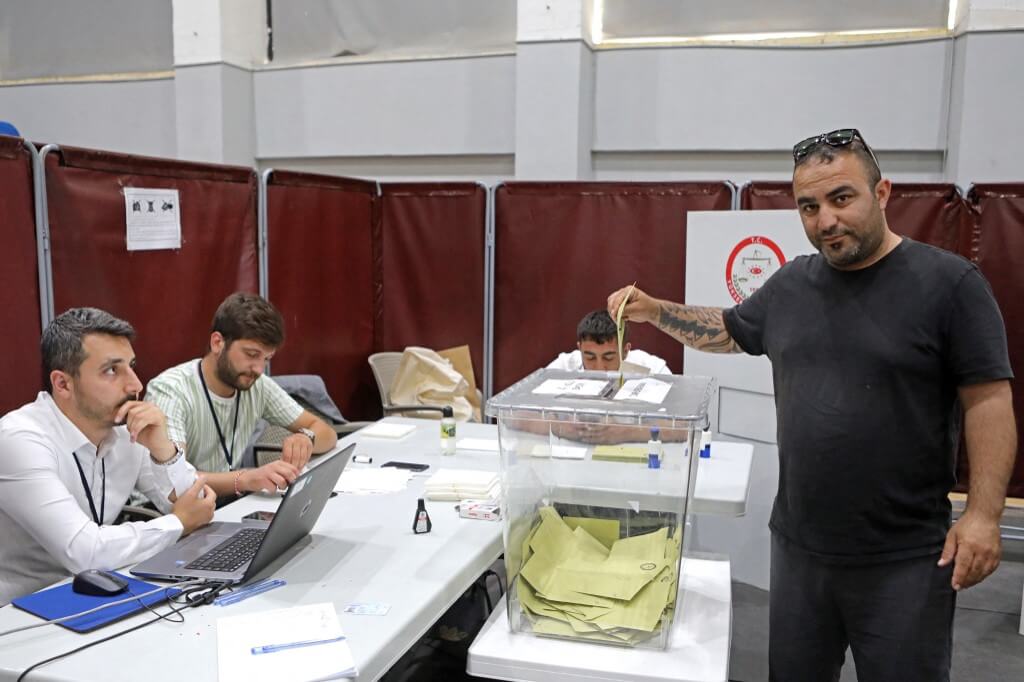If it were up to voters in the Turkish-occupied north of the island of Cyprus, President Recep Tayyip Erdoğan would already be out of office, but they may not get their way.
Erdoğan is tipped as the frontrunner in Sunday’s runoff election, seen as crucial for his country but also important for the island that has been divided for almost half a century.
Conservative Erdoğan is heading into the second-round vote after beating his secular and leftist challenger Kemal Kılıçdaroğlu two weeks earlier but failing to win an outright majority.
In the first round, the self-proclaimed Turkish Republic of Northern Cyprus (KKTC) bucked the mainland trend, strongly favouring Kılıçdaroğlu with 53.5 percent of the vote against 39.4 percent for Erdoğan.
To many, the result reflected discontent with both Erdoğan and with life in the statelet that is home to Turkish Cypriots as well as a large number of settlers and soldiers from the Turkish mainland.
“There will be changes here only if Kemal Kılıçdaroğlu wins,” said Necmi Belge, a 70-year-old Turkish Cypriot retiree with Turkish citizenship, who said he voted against Erdoğan.
Cyprus has been divided since 1974 when the Turkish army invaded the northern third of the island in response to a coup that had sought to unite the entire island with Greece.
A UN-patrolled “Green Line,” secured with razor wire and sandbags, has since cut across the Mediterranean island that is located about 100 kilometers (60 miles) south of Turkey’s coast.
‘Game over’
Repeated rounds of UN-led talks have failed to reunite majority Greek-speaking EU member the Republic of Cyprus in the south and the Turkish-speaking northern statelet that is recognized only by Ankara.
Erdoğan has argued the island should be formally split into two states — an option strongly rejected by the south and the international community which favors a bi-zonal or bi-communal federation.
Although Kılıçdaroğlu has said little on the Cyprus question, many observers believe a change at the top in Ankara would offer the best hope to jumpstart the long-stalled reunification efforts, as Turkey’s relations with the EU have soured under Erdoğan.
Nazif Bozatli, a KKTC representative of Kılıçdaroğlu’s Republican People’s Party (CHP), said that “Erdoğan’s two-state solution … is not realistic”, as he cast his ballot in a gym in the divided capital Nicosia.
He added that “we want a mutual federation with mutual respect”.
Cypriot President Nikos Christodoulides has been watching the Turkish elections “very closely”, said Ioannis Ioannous, a Greek Cypriot analyst at think-tank Geopolitical Cyprus.
“If Kılıçdaroğlu wins… the EU will play a more active role” in mediation between the two sides, Ioannous said, “and we will have a realistic chance to return to the negotiating table”.
Nearly 144,000 voters are registered in northern Cyprus, including Turkish settlers and troops and Turkish Cypriots who hold Turkish citizenship.
The first-round vote result resembled that “of a major opposition city in Turkey,” said a foreign diplomat, speaking on condition of anonymity, who read it as a rejection of Erdoğan’s stance on the Cyprus question.
Some in northern Cyprus have cheered Erdoğan’s advantage, among them Turkish settler and restaurant owner Hassan Hamam, 30, who praised the “very strong” leader as a man who “always carries out his projects.”
But others voiced bitterness about Erdoğan taking an early lead. “Game over,” said one Turkish Cypriot lawyer. “He will win, no matter the results here in Cyprus … and we will pay the price.”
‘Mutual respect’
Belge, the pensioner, voiced a degree of resignation about the election and its likely impact: “We don’t expect anything to change. The change in Cyprus must come from Cypriots.”
But the people of northern Cyprus face a dilemma, said another voter, Yonca Özdemir, a 50-year-old woman who has lived on the island for 16 years.
“The KKTC is very linked to Turkey,” she said. “Everything that happens there has an immediate impact on us.” But while many Turkish Cypriots favor reunification, she said, “we need Turkey’s approval for this”.
Kemal Baykallı, founder of the activist group Unite Cyprus Now, said for peace talks to resume, Turkey’s next president would first have to restore “good relations” with the European Union.
“If the opposition is elected … I think they would need to reevaluate the decisions of Mister Erdoğan on the two-state solution,” he said.
“But they will also need to set up a more open and respectful relationship with the Turkish Cypriots.”
© Agence France-Presse

